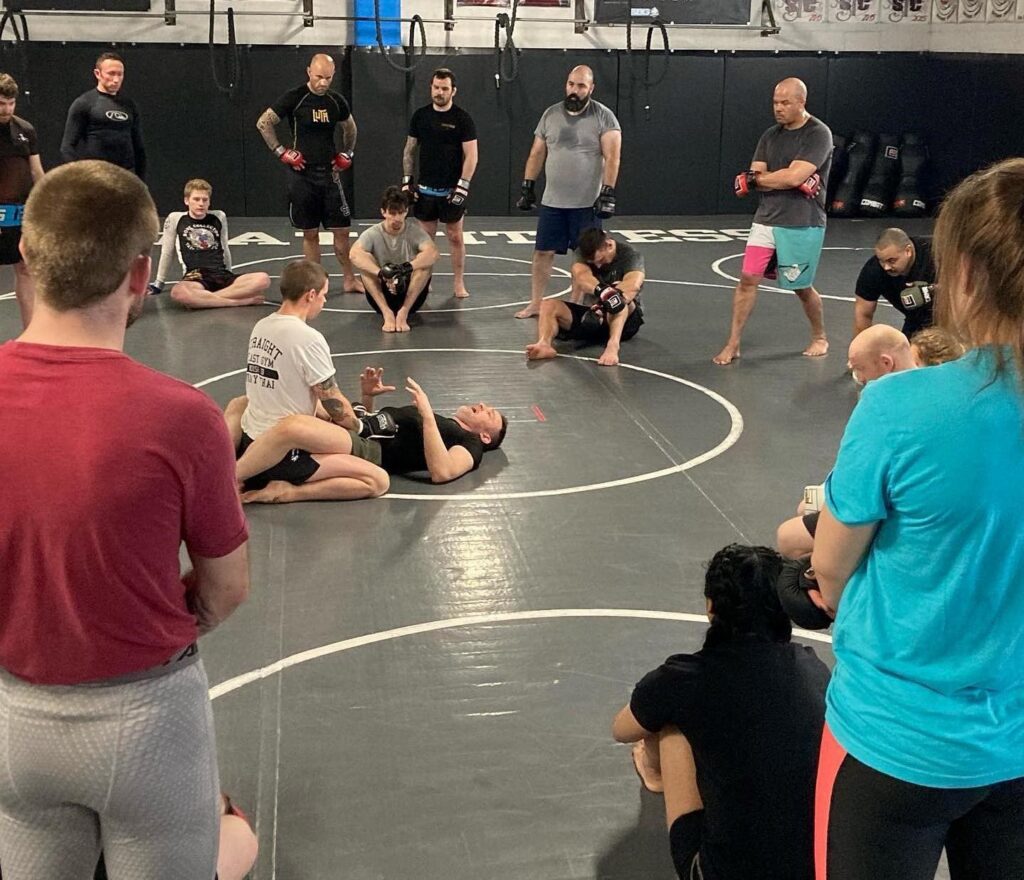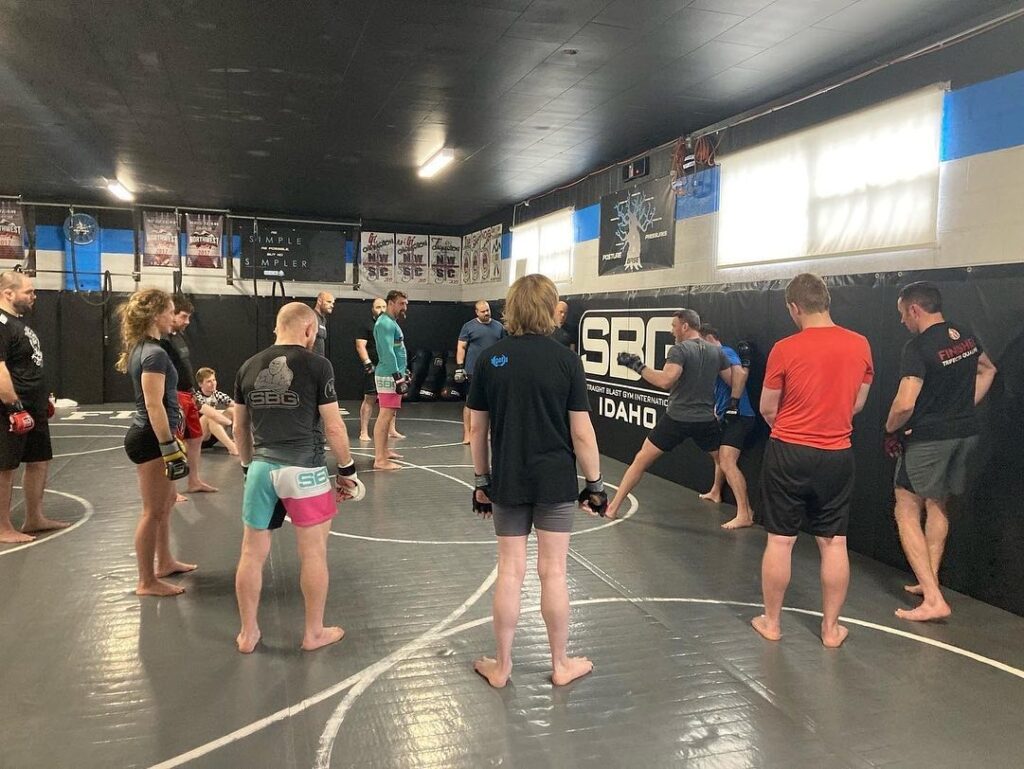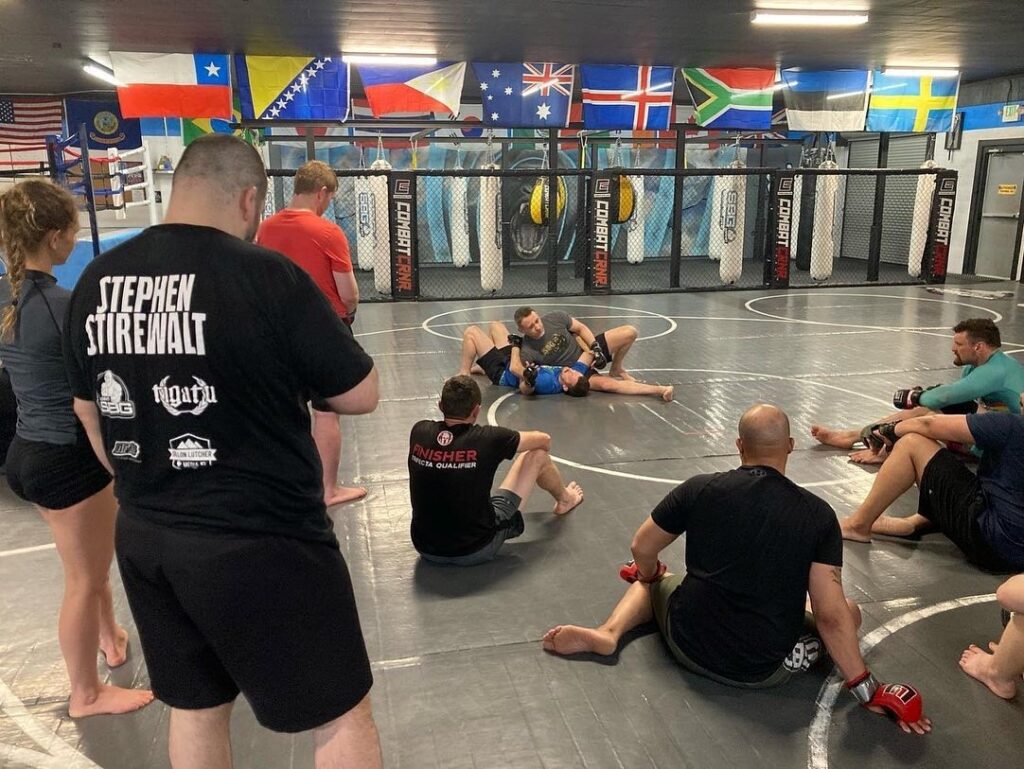Here are some images from my 5th annual seminar at Combat Fitness in Boise, ID last year.
Usually when I do seminars, I’m asked to teach Jiu-Jitsu and/or Muay Thai. This time, however, the Boise crew requested that I do two days of MMA. They have a sizable fight team as well as an interest from the recreational students.
The conversation quickly pivoted when I suggested that instead of MMA per se, I teach a couple days of Vale Tudo. They agreed, and we were set.
For those unfamiliar, Vale Tudo (Portuguese for “anything goes”) is the predecessor to modern MMA. In fact, Mixed Martial Arts itself is a relatively recent term; in the early days of the UFC the “sport” was widely referred to as NHB, short for “no holds barred.”Vale Tudo was the proving grounds for Brazilian Jiu-Jitsu, where the “Gracie Challenge” was an open call to test BJJ against representatives of other martial arts disciplines or street fighters. There were no time limits, all strikes were allowed, and there were little or no rules.



This was the original intention of Jiu-Jitsu: not to prevail against other Jiu-Jitsu practitioners in a grappling-only environment, but to be the most effective form of unarmed self-defense.
Over the years, the evolution of the art has seen the proliferation of both MMA and sport grappling (IBJJF, ADCC, and all the other gi and no gi submission grappling) formats.
In the process, the debates about “street vs. sport” when it comes to BJJ have also evolved.
My observation is that both sides are largely making reasoning by analogy arguments and overlooking the first principles fundamentals as a result….
On the one hand, there are the Jiu-Jitsu “purists” who argue that modern BJJ & no gi grappling have become so specialized around sport oriented games and tactics that many have adopted habit and focus on techniques that would be less than ideal (if not downright dangerous) in a real fight.
On the other hand, there are the modern BJJ athletes who argue that:
- Most of the “Self-Defense BJJ” schools, instructors, and students are not very good because they spend all their time practicing things like the old Gracie self-defense curriculum rather than actually drilling and rolling realistically
- The level of BJJ skill has risen significantly since the “old school” days when fighting was the priority
- Given that the new generation of BJJ / grappling athletes is exceptional and better than the older generations, wouldn’t it make sense that they would be at least as capable or better when it comes to handling themselves in a fight?
Which of these perspectives is correct?
Well, there’s a lot to unpack here and I won’t try to tackle all of it, but the short answer is: it really has to do with what context we’re dealing with.
For example…
Yes, there are definitely some self-defense BJJ schools that are teaching curriculums that are much more akin to traditional martial arts when it comes to their training methods, and their skills do not carry over very well to live training environments.
And I would grant that by and large, the general level of skill does increase and compound with each subsequent generation. To deny this would be to deny evolution (as though it occurs everywhere except in BJJ).
AND I would agree that most very skilled “sport” grapplers, even more so those who are world level, are so disproportionately skilled compared to most people they’d ever meet in a real world fight that they would be able to handle themselves very well.
All that said and acknowledged, this isn’t a black and white issue. We need to think beyond reasoning by analogy (conventional wisdom, hearsay, status quo bias, etc.) and be willing to consider different contexts.
Because I can also tell you for sure that many of the habits that the majority of modern BJJ practitioners and grapplers have as a result of how they train every day and approach the game are not optimal for self-defense / fighting situations. Just because they might very well get away with it regardless doesn’t change that fact.
I can also tell you that pretty much every time you see one of the “new school” guys roll their eyes when people mention (for example) Rickson Gracie have never directly trained with him (or anyone who is very familiar with the refinements he developed) in a meaningful way. The conventional wisdom goes something like:
“Ok, he was the man back in the day, but look at Choke bro… he wouldn’t stand a chance against even black belts nowadays. The game has moved on.”
Well, I can attest that there are many high level and very experienced black belts who have encountered Rickson’s “basic,” fighting oriented Jiu-Jitsu and come away as though they’ve just had a religious experience.
In virtually all cases, you hear the same things… to paraphrase: “I’ve never felt pressure like that / been controlled like that before; it’s like he could read your mind; and perhaps most significantly: I thought I was great at X, but he just showed me how to make my best technique ten times better.”
If the game and skill levels evolve rapidly –– and they do –– then how is it that some of these “old school fighting BJJ” guys, Rickson Gracie in particular, continue to inspire such paradigm shifts? Is it just some sort of mass hypnosis hero worship LOL?
The answer lies in this: Rickson’s real legacy isn’t just that he was the Gracie family champion for a generation, it was that he is the greatest first principles thinker we’ve likely ever had to date.
Before you scoff at the thought and start rattling off other well known innovators, consider again how many world champion competitors over the years have cited his ability to cut through the complexity and be so effective by doing so little.
What most consider “basic” is actually all about simplification at the very highest level.
There’s absolutely no disputing that many of the great champions today are superior to most great champions of past decades, and this will continue to be true. But instead of thinking in such linear and hypothetical terms as “Who would win, peak Rickson or [insert modern athlete]”, let’s instead consider a different context:
For example, as a first principles thinker and innovator, is it possible that Rickson could show you how to get equal to or better results in only two steps when you’ve been successfully operating under the assumption that 4 were required?
Really think about that.
And then consider this: what if the exact same principles that function at a high level to protect you and give you a disproportionate advantage when applying BJJ to a real fighting scenario were the exact same principles that can function at a high level against (for example) a very good guard passer…
But in order for that to be true, you’d ultimately have to question some of your most closely held assumptions about the guard, such as always maintaining 3 to 4 points of contact.
Ahhhh (lightbulb moment)…
Because a first principle of defending against strikes is distance management, right?
And by the same token, what is the #1 priority of a guard passer, by definition?
To get as closer to you so that they can get past your legs and control your upper body.
So would it not make sense in that context that the same skills that keep you outside of striking range would also be effective for keeping a guard passer as far away from their goal position as possible?
Is the penny dropping?
It certainly did for me years ago. In fact, it inspired me to completely rehaul and simplify my guard game, then break it all down based on these first principles so that I could get similar and repeatable results with my own students as well as those I worked with teaching seminars across the country.
The result was my The Pillars: Open Guard Mastery System
Of all my courses, it may be the one I’m most proud of.
While most BJJ students and grapplers today are drawn to complexity seeking to emulate the skill sets of their favorite grapplers, the reality is that it’s never a question of whether their skills are world class. Clearly they are. It’s not in dispute.
The real question is, could even those world class athletes be getting the same result with even less complexity (i.e., simpler)?
And: if you are NOT a world class athlete who can train full time or are no longer in your athletic prime, wouldn’t it make sense for you to simplify your game (with the correct, little known details), so that you could be equally proficient applying the same “game” (principles) whether you’re doing gi Jiu-Jitsu, no gi grappling, or training to fight and survive Vale Tudo style?
To your BJJ success,
Coach Stephen
To check out the course, Click Here
